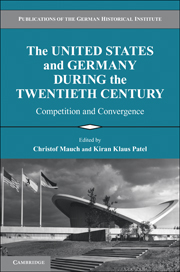Book contents
- Frontmatter
- Contents
- Contributors
- Acknowledgments
- 1 Modernities: Competition versus Convergence
- 2 Empires: Might and Myopia
- 3 Religion: Belief and Power
- 4 Law: Constitutionalism and Culture
- 5 Welfare: Entitlement and Exclusion
- 6 Immigration: Myth versus Struggles
- 7 Masses: Mobilization versus Manipulation
- 8 Market: Consumption and Commerce
- 9 Authority: Schools and Military
- 10 Gender: Equality and Differences
- 11 Environment: Conservation versus Exploitation
- 12 Film and Television
- 13 Education: Universities and Research
- 14 Media: Government versus Market
- Index
12 - Film and Television
Published online by Cambridge University Press: 12 October 2018
- Frontmatter
- Contents
- Contributors
- Acknowledgments
- 1 Modernities: Competition versus Convergence
- 2 Empires: Might and Myopia
- 3 Religion: Belief and Power
- 4 Law: Constitutionalism and Culture
- 5 Welfare: Entitlement and Exclusion
- 6 Immigration: Myth versus Struggles
- 7 Masses: Mobilization versus Manipulation
- 8 Market: Consumption and Commerce
- 9 Authority: Schools and Military
- 10 Gender: Equality and Differences
- 11 Environment: Conservation versus Exploitation
- 12 Film and Television
- 13 Education: Universities and Research
- 14 Media: Government versus Market
- Index
Summary
On September 28, 1993, two of the most respected German and French newspapers, the Frankfurter Allgemeine Zeitung and Le Monde, published an unprecedented open letter condemning Hollywood for strangling the European film market and thereby endangeringWestern culture itself. Written byWimWenders and others, and signed by four thousand European film artists and intellectuals, the full-page ad responded to the 1993 General Agreement on Tariffs and Trade (GATT) negotiations between the United States and the European Union. GATT sought to foster free trade and thus end subventions and protective tariffs on a wide range of goods and services, including audiovisual media. The American delegates argued that movies are products like peanuts or automobiles and must not be subsidized in the global marketplace. They decried film subsidies and television quotas as unfair protectionism. The Europeans, by contrast, pleaded for the continued protection of their cinema. They countered that movies are not commodities but rather expressions of national identity, history, and tradition. For them, filmmaking in continental Europe was inconceivable without state funding. This clash over two concepts of culture threatened to derail the entire free-trade agreement. In the end, the Americans acquiesced, confident that even a subsidized European cinema would not pose a threat to Hollywood.
The basic claim made by European filmmakers is hard to dispute. Hollywood blockbusters have captured between 70 and 90 percent of the German market for the last three decades. Even prize-winning domestic productions never reach comparable audiences. Although the public attack on Hollywood in 1993 was sharper than usual, it only reinforced the old self-image of Germans as victims of a predatory American entertainment industry – a competition that dates to the 1920s, when a German film critic called Hollywood's influence more pernicious than Prussian militarism because it wins over hearts and minds. (In 1926, almost half of the films shown in Germany were American imports.) Over the years, the German film industry has turned to imitations, co-productions, and noncommercial art films to counter Hollywood's domination. Critics have asked: How could German filmmakers match the modernity of American cinema without abandoning their venerated ideals of high culture? Is film a universal language, as was claimed in its early years, or is it specific to a time and place? Discussions in Germany about cinema have always performed double duty as debates about German culture and national identity.
- Type
- Chapter
- Information
- The United States and Germany during the Twentieth Centurycompetition and convergence, pp. 194 - 210Publisher: Cambridge University PressPrint publication year: 2010

